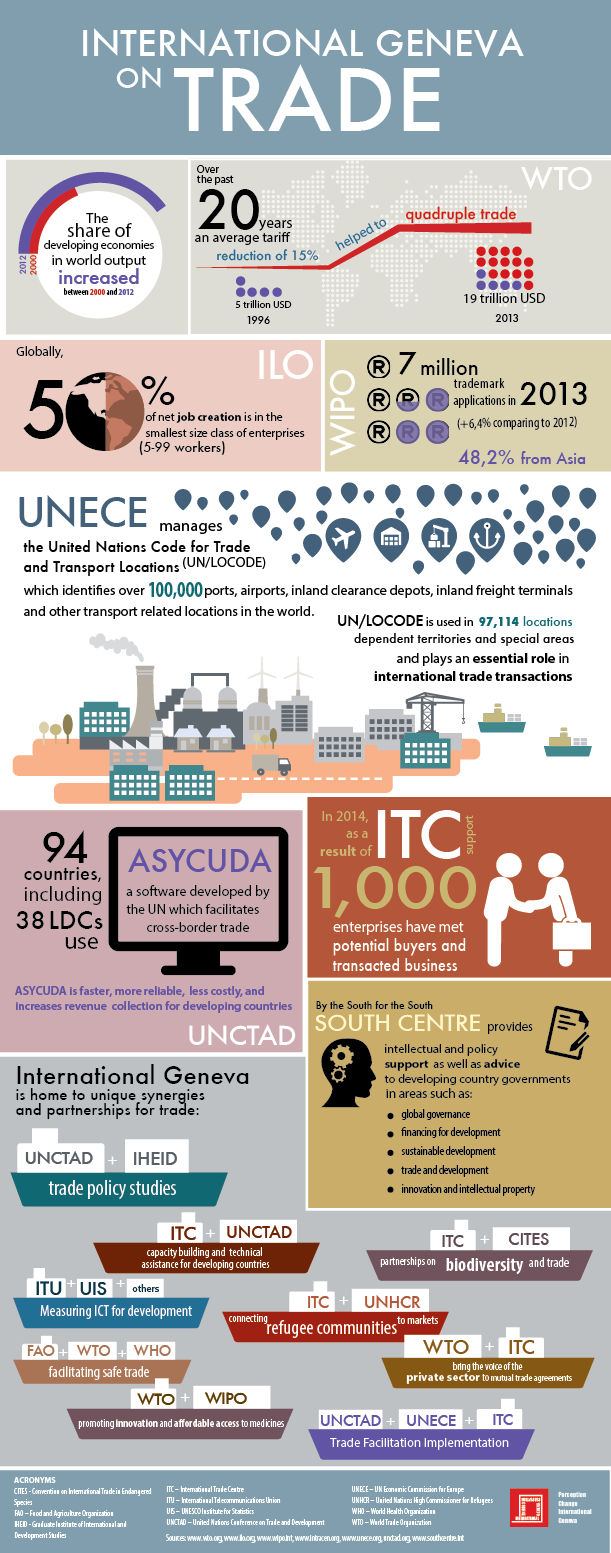The world's most impressive ports are in cities marked by trade. Although Geneva does not even have a port for container ships, it is still a global hub for trade. The World Trade Organization (WTO), the International Trade Centre (ITC) and the United Nations Conference on Trade and Development (UNCTAD) are at the core of this hub. But there are a number of other international organizations that work on trade-related issues including the United Nations Economic Commission for Europe (UNECE), the South Centre and the International Labour Organization (ILO) that are anchored in Geneva.
Furthermore, with over 400 trading companies, Geneva is also a big trading hub for commodities. It accounts for roughly on third of world trading in oil, rice and cereals and for about half of the global coffee and sugar trade.
Our daily lives are highly influenced by trade yet we hardly think about it. Did you know that...
1) Less tariffs means greater trade. Over the past 20 years, an average tariff reduction of 15% helped to quadruple trade worldwide! That has not only helped to boost local economies but also to increase the global standards for health, security and environment, which in turn increase average life expectancy.
2) There is no need for trade wars. The WTO has handled over 500 trade disputes in the last two decades. This resolves conflicts and reduces trade tensions, so that trade can flow more freely and easily, which also increases your country's exports.
3) Trade brings prices down. Trade liberalizing measures increased more than 60% in recent years, which has helped to bring down the prices of imports. This translates into spending less on our purchases.
4) More trade means more choices. The WTO now has 161 member countries, which account for about 98% of world trade! So, the more countries get included in global trade, the greater your choice of products is when we go shopping (and the more economic growth will be stimulated)!
5) Innovation fuels trade. Patent applications rose by 9% in 2013. They help extend trade and will eventually find their way into our smartphones, cars, houses or gadget which don't even exist today.
Trade fights poverty. By increasing their share in world trade, least developed countries (LDCs) reduced poverty (defined as people living with less than 1,25 USD a day) from 65% of the population in 1990 to 45% in 2010! This contributed to the inclusion of more and more people into the riches of world trade, not only cutting living costs, but also raising living standards globally.
It's important to note that trade is not always the solution to poverty or fragile economies but it can help boost local economies, increase employment and bring people together. Like ships that get loaded and unloaded, we can look at Geneva as a global trade hub that discharges old trade policies and replaces them with new ones so we have an updated trading system that works for all. Have a look at our infographic that gives a snapshot of the impact Geneva has on trade.

